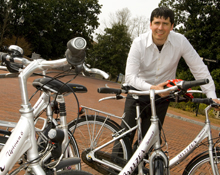People
March 29, 2010
First Person: 'Smart lock' innovation will boost bike share

Jamie Smith is manager, business process analysis, and director of Bike Emory
On March 9, the Georgia Institute of Technology received a $50,000 Ford College Community Challenge Grant to establish an innovative bike share program with bicycles from Emory’s bike share program. Georgia Tech mechanical engineering students designed a “kiosk-free” bike share infrastructure, which locates and checks out bicycles via mobile phones. Emory, which supported the grant, will test the first fleet of bikes this summer.
Bike Emory’s Bike Share program has been successful and popular, with more than 2,000 check-outs since the program launched in the summer of 2008. However, I’ve come to realize that in order to grow the program, I needed to automate the current bike share system, which requires users to speak to an attendant, show an Emory ID, get a key and use a U-lock.
After months of research I found that the automated bike share systems available in the U.S. market are expensive, with costs not scalable to universities. Daunted, I was forced to think creatively to find a solution.
Then one day it came to me. I thought, why not partner with Georgia Tech to create our own bike share system? We have the bike share expertise and support infrastructure, and Georgia Tech is bubbling over with innovators and engineering talent. So I reached out to Georgia Tech with the idea of creating a fully automated bike share system.
Eventually I was introduced to a professor at the Georgia Tech School of Engineering. Dr. Bert Bras is from the Netherlands, where 40 percent of the population commutes by bike, so he knows a thing or two about urban cycling. He suggested that one of his senior capstone classes take on the project of creating an automated bike locking mechanism. To keep a long story short, one group of students actually created a working prototype lock and decided to continue to pursue the creation of a bike share system with Emory.
What would an automated bike share system need to be successful? I told the students that a world-class system would need to be secure, easy to use, keyless, trackable, fun, green and affordable. We also discussed innovative ideas such as using mobile technology and GPS to make the bikes truly automated, but I fully expected to have to come back down to earth and settle for something less than what we dreamed.
To my amazement, the brilliant group of young engineers — with the support of bike and part donations from Advanced Sports and a $50,000 grant award from the Ford Foundation — brought the dream to life.
The new bikes will allow users to check bikes in and out with their mobile phones. The mobile technology connects to an innovative “smart lock” that will release the bike when a valid text request is received.
This will eliminate the need for staffing and keys. This also means that this system will be truly flexible because the bikes do not have to be returned to just one or two stations. They can be located to meet demand. Since the bikes will be equipped with GPS we can use that data to track usage patterns and to make sure that the bikes are not being stolen.
The GPS and mobile technology will also allow us to provide fun and utilitarian mobile applications for users that will allow them to easily find a bike and track their miles, calories burned and carbon footprint reduction by taking a bike instead of a single occupancy vehicle.
Most importantly, expensive, fixed infrastructure is no longer needed, so Emory can afford to expand the program to meet demand.
The first fleet of bikes will be rolled out at Emory this year as part of a pilot test. Following the test, the first fully implemented program will be launched at Emory.
It is my vision that the launch of the automated bike share program, combined with cycling road infrastructure improvements planned and already in progress, will transform the Emory area into one of the premier places to travel by bicycle. Longer term, I hope to work with the team to expand the systems into surrounding neighborhoods and ultimately all the way to Georgia Tech to create a continuous corridor of bicycle transit.
We face many transportation challenges in Atlanta. History has proven that great challenges push us to innovate. This is a testament to how passion, creativity and genuine partnership can overcome seeming insurmountable obstacles to create affordable, healthy and fun transportation options that people can use to change the way they move about our city.
None of this would have been possible if Emory’s leadership did not create an environment that nurtures innovation in the areas of sustainability, transportation and land use. I am proud to be a part of a university that believes it should be more than just a world-class place to learn, but also a world-class place to live, work and ride a bike.
